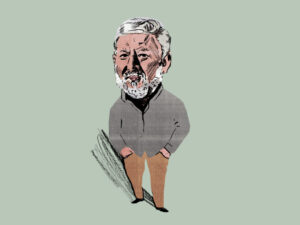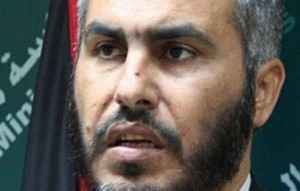The hostage negotiator on what it will take to secure the return of those held captive by Hamas in Gaza.
A few days after the brutal violence of 7 October, one Israeli peace activist was already working behind the scenes to try to free the dozens of Israelis taken captive by Hamas.Gershon Baskin has spent nearly two decades negotiating with Hamas, and in 2011 secured the return of the Israeli soldier Gilad Shalit after five years of captivity. According to Israeli figures, 242 hostages are now being held in the Strip. Baskin knows from experience that the involvement of other countries – Qatar, which hosts Hamas’s leadership in Doha and facilitates money transfers to the group, and Egypt, which controls the southern Rafah border crossing into Gaza – will be key to their safe return.
Though Baskin, 67, updates Israeli officials about his work, he never asks for permission.
“When I knew there was no contact between Qatar and Israel, we gave people phone numbers,”
he told me over video from his home in Jerusalem.
“It took some days, because it wasn’t clear from the side of the Israeli government, and of Qatar, if they wanted [to take up the offer of] direct contact.”
This apparent lack of initiative from Benjamin Netanyahu’s government might surprise some – and is cold comfort for the families of hostages – but this is simply
“how things work”,
Baskin said.
So far, five hostages have been released, four through negotiations with Qatar and one, a soldier, in a rescue operation by Israeli security forces. Hamas has published two videos of a total of four detainees, all women, and has reportedly sent text messages to the families of hostages, offering information. All this is likely intended to increase public pressure over their fate on the Israeli government, Baskin explained.
Aside from the Qatari negotiations, another channel may be active, too, he said.
“Through Beirut, with direct US involvement.”
These are the same channels used for negotiations between Israel and Lebanon over their maritime border last year.
“In Beirut there is probably direct contact with Hamas people who have the lines to the military command in Gaza. If this is true it is very promising,”
he believes.
On 28 October Netanyahu reiterated Israel’s two aims for its war, to destroy Hamas and to recover the hostages, and has since said Israel will not agree to a ceasefire without the release of hostages. The destruction of Hamas is possible, said Baskin, but would entail
“lots of destruction, lots of killing, with victims on our side, too. You can’t do all of this and save all of the hostages.”
There is only way to assure their release. “The price is well-known: it’s the release of all of the Palestinian prisoners [held in Israeli jails].”
As many as 559 of these detainees are serving life sentences for murdering Israelis. Baskin estimated that some 7,000 Palestinian prisoners, including Hamas operatives involved in the horrors of 7 October, would be part of any deal.
“Whoever has to make this decision, the weight is enormous,”
he said, but
“it’s the only way to bring them all back alive”.
Such an exchange poses the dilemma of where to release detainees to. Those in prison for murder could be sent to Gaza, or to other countries that support Hamas to some degree, such as Turkey, Iran or Qatar.
“I’ve spoken to a few [Israeli] security officials who have said they are only prepared to send [prisoners] to Gaza – and then [they] will deal with them one by one,”
Baskin added, with a hint of darkness. He pointed out that every Hamas operative involved in Shalit’s detention, including his four prison wardens, is now dead.
“I imagine that anyone who has touched the abductees now, it will be their end – including those who sent militants to massacre people [on 7 October] and take people captive.”
Beyond establishing the first contact, Baskin has not been party to the negotiations. But until three days before we spoke on 31 October, he had maintained communications with officials in Hamas’s leadership in Gaza, Beirut and Doha, and pressed them to let go women, children and the elderly on humanitarian grounds. But that line of argument doesn’t influence Hamas, he said. Such communications have since stopped.
“This could be a sign that they are angry with me, I have said some very harsh things to them, but it could also be that something very serious is happening. It’s the nature of such negotiations. When it’s advancing usually the sides stop leaking information and talk seriously.”

Robb Hutter and Gershon Baskin in the Interns for Peace. Program in Kufa Qar’a in the little triangle (a Palestinian village inside of Israel).
In June 2006, days after Shalit was abducted by Hamas, Baskin opened communications with the group to try to secure his release. The soldier eventually went free after five years and four months captive, in exchange for 1,027 Palestinian prisoners – though the offer had been “on the table”, said Baskin, since December 2006.
He has been negotiating for the return of the bodies of Oron Shaul and Hadar Goldin, both Israeli soldiers, since they were killed in Gaza in 2014 (Hamas maintains they are still alive). And for the release of two Israeli citizens, Avera Mengistu and Hisham al-Sayed, who have been held in the Strip since 2014 and 2015, respectively, and who both have mental health issues.
In 2011 Baskin got close, he said, to getting Hamas to agree to a long-term ceasefire, and had shown his draft agreement to the UN secretary-general and to the then Israeli defence minister Ehud Barak. But then, in 2012, Israel assassinated Ahmed Jabari, the commander of Hamas’s military wing, in Gaza,
“destroy[ing] any possibility of advancing the agreement”.
Jabari
“had gotten the latest version of that document in Arabic that same morning”,
Baskin said.
The primary obstacle to his efforts, said Baskin, has long been that Israel
His most recent attempt to forge a ceasefire deal was in September 2022; he was clear that he never used the word “peace” in relation to Hamas. “I convinced Ghazi Hamad [a member of Hamas’s political bureau] to meet me somewhere neutral,” he said.“didn’t really intend to carry out any real agreement. Israel wanted to keep Hamas weak in this siege where more than two million people live a sub-standard life. I thought [eventually] something would blow up.”
“I suggested three different countries where we could meet, and in the end he got cold feet.”
Though Baskin can’t be certain, he believes it possible that Hamad found out what Hamas was planning on 7 October, because he left Gaza for Beirut a few months before.
“In my eyes, this is a betrayal of his people – and I told him that.”
The week we spoke, Baskin publicly severed contact with Hamad, whom he has known for 18 years, after seeing a video of him vowing to repeat 7 October until Israel is annihilated.
The big difference between the Shalit negotiation in the 2000s and the plight of the hostages in Gaza now is time.
“We don’t have five years and four months,”
said Baskin.
“We have days before the IDF will go into Gaza [on the ground], and they will enter the tunnels to look for the hostages and the terrorists and their leaders. The moment this starts, the window of opportunity [for] negotiation will close.”
Over the weekend, there were reports that Netanyahu had refused an offer by Hamas to release all the hostages on condition of a ceasefire.
“There was no such offer for real by Hamas, as far as I know,”
Baskin told me, and added that
“all the comments, from all the sides, including the mediators, is part of the negotiations and you have to understand it in this context and not believe too much in what anyone says [in public]”.
Baskin is clear on what needs to happen if Israel reoccupies Gaza:
“[It must] announce that we don’t intend to stay. Heaven forbid [the government bows to] the pressure from former residents of Gush Katif [Jewish settlements in Gaza ]”
to go back to the Strip. That would be “a disaster for Israel”.
If Hamas is removed from the region through this conflict, an international Arab force must stabilise Gaza, Baskin said, as it did in Lebanon after the civil war, until Palestinian Authority elections can be held. Alongside this, there needs to be a
“real political process that prioritises the two-state solution… with massive international support and pressure on both sides”.
The starting point must be
“the recognition that everyone who lives between the river and the sea has the same right to the same rights. If we don’t start there, we won’t get anywhere.”
Israel
“has to come up with something better for the Palestinian people, so that they can blame Hamas for dragging the Palestinian issue backwards 75 years”, he concluded. And Israelis have to wake up: “People don’t want to hear it, but we need to get out of the delusion that you can occupy, keep, guard another nation for 56 years and expect that you will have peace. You can’t hold two million people in a small territory like this, in a dead end, and expect quiet.”
Click here to read the original interview on The New Statesman




